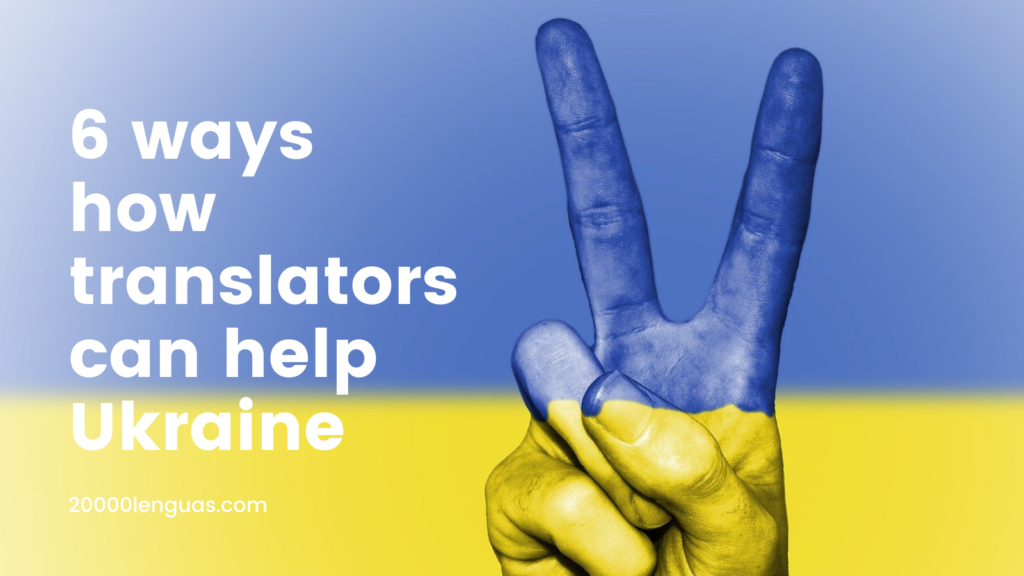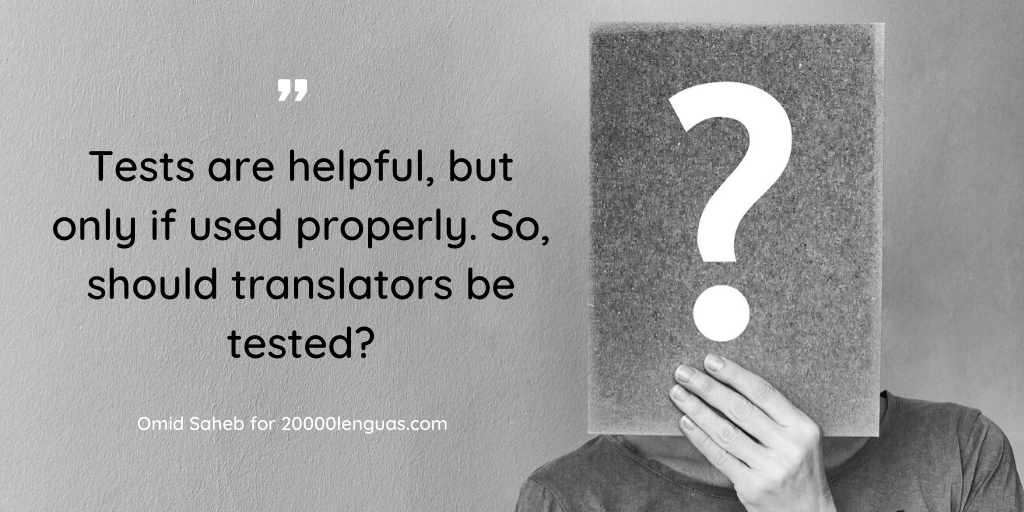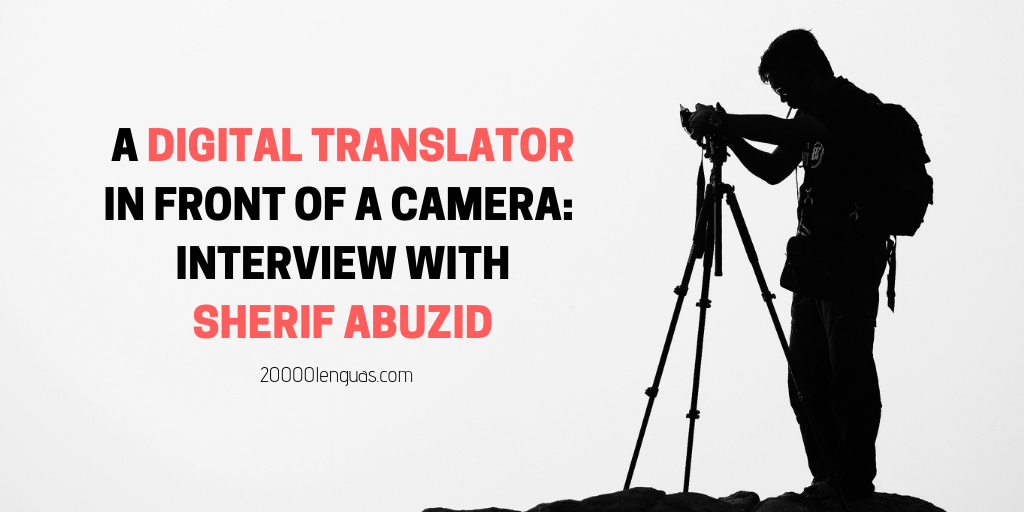Ce site utilise des cookies afin que nous puissions vous fournir la meilleure expérience utilisateur possible. Les informations sur les cookies sont stockées dans votre navigateur et remplissent des fonctions telles que vous reconnaître lorsque vous revenez sur notre site Web et aider notre équipe à comprendre les sections du site que vous trouvez les plus intéressantes et utiles.

A digital translator in front of the camera: interview with Sherif Abuzid
Août 13th, 2019
Dear translators, we are very happy to present you Sherif Abuzid: the specialist we interview in the middle of your summer holidays. Sherif is an example of a multitasking translator who keep improving and learning all the time. So have a coffee break and enjoy this presentation.
- Thank you very much for accepting my interview invitation. It is a pleasure to share your experience and digital knowledge with the followers of this blog. First of all, tell us more about yourself: who are you? A translator? A digital mentor? A passionate professional vlogger? Which are your studies and professional experience?
Thanks, Olga, for giving me the chance to speak with you and your blog readers. I am a native Arabic translator and live in Giza, Egypt, just 30 minutes away from the pyramids. Many people ask me what exactly is my passion? Is it translation or digital marketing? My dream since I was in high school is to become a translator, which was strange for people of my age. And the most exciting moment in my life is when I finish translating a project. However, since I started working as a freelance translator, I realized that I need additional skills to succeed in this business. So, I studied sales and marketing at the American University in Cairo, got an MBA in international business administration from the Arab Academy in Cairo, and now I study digital marketing through online courses. I am studying all this because I believe freelance translators are not just translators; they are business owners who have to know things beyond the tactics of translating a text. For video creation, it all started as a challenge for myself. I wanted to acquire a new skill that most people are afraid of. It was a video! We always feel they are vulnerable and are scared to talk to a camera because others may make fun of us! But I read a sentence that says, the opportunities are outside our comfort zone. This idea pushed me beyond my fears of being in front of a camera, and I decided to produce one video every day for 30 days in January 2018! And it was an exciting experience that gave me more confidence than I can imagine. Also, the feedback from my colleagues and friends was amazing. I kept making videos, and now I started to use it for the clients’ side. I am on a mission now to create 100 videos on LinkedIn, already 12 videos released before this interview.
- When did you discover your interest in languages and translation?
When I was in primary school, I was weak in English language, but Mona, one of my professors, and Abdel Wahed, a friend of mine, motivated me to study English very hard in order to succeed in high school as my general grades were weak too! When I managed to read small books and newspapers in English, this opened a new window for me to see a new world around me! Then the internet came, which was a turning point for me, as I can now communicate with people from other countries. So, studying to be a translator was the right decision as I could study English more and talk to people from around the world.
- Your website offers different kinds of translation services, tell us which is your particular domain of specialty in translation where you feel strong?
My main specialization is technical and marketing translations. I love marketing translations more as it requires creativity. You have to understand the sense behind every sentence written in a brochure, or a website, then try to translate it as it looks like it was written in your native language. For the other services shown on my website, I outsource them to other colleagues, and now I am building an in-house team to help me. I was losing many translation projects because they were not on my areas of specializations. So, I decided to outsource this work to other translators and manage these projects along with my business partner.
- What do you like the most and the less of your profession? Why?
The best part for me is meeting and talking to people from different cultures. This widens the scope of my knowledge and lets me see the world from different perspectives. What I don’t like is the pressure some clients add to translators when it comes to deadlines. This can affect the life-work balance I am trying to have on my life.
- What is the role of technology in translation now and at the beginning of your career? Does “new” mean “better”? If so, why?
I still remember SDL Dongle! This was a small device like a flash drive; we had to plug it into our computers to run SDLX, which was a very popular CAT tool back then. Now, we work with online CAT tools such as XTM and Memsource. Technology is changing the translation and localization industry. It is creating both new challenges and opportunities for translators, but most of us resist change, especially those who are less skilled, in my opinion. You already see the debate about machine translation and how it is horrible, and many translators are rejecting machine translation post-editing assignments. Machine translation is here to stay! Large companies have invested billions in improving it, and it started 30 years ago. So, it is not something new or just trendy. New job titles will appear, such as MT post editor. I believe that we have to embrace technology and use it for our own interests other than resisting and ignoring it.
You have to understand the sense behind every sentence written in a brochure, or a website, then try to translate it as it looks like it was written in your native language
- We all follow your professional videos and tutorials. Tell us more about your digital passion: we want to know more about « BizBuddies in Translation » together with the amazing Tanya Quintieri. How do you choose the topic of your videos?
I love digital marketing because it is very challenging. It has many parts, and you have to connect them together. It is a bit hard, and I love to do hard things! It is funny how the BizBuddies in Translation show started. I was testing a specific client-acquisition strategy using Twitter, and Tanya became one of my clients through this. I followed her writings and tutorials. One day, I emailed her and wrote: “Look, we both love sharing our experiences, but we do not have one place to speak with other translators. What if we make a show for translators together?” She said: “let’s do this!” For the topics, I am in charge of generating ideas, and Tanya reviews them before we decide which topics to talk about. Actually, she is good at controlling me when I suggest something not related to translators. Our strategy is to provide practical tips to our colleagues, not just general advice.
- Which do you think is the best platform to help translators and language professionals to keep learning from other specialists?
Podcasts are a great platform for translators. They are like YouTube, but in an audio format. You can listen to experts from different industries and learn from them. Also, there are some podcasts for translators only, such as Marketing Tips for Translators and Speaking of Translation. You can listen to podcasts at any time of the day and when you are walking or driving.
- You are continuously reinventing yourself. What is the best advice you can give to a colleague who follows you on your social media channels?
My advice for translators is to look at themselves as business owners, not just technicians (translators). If you like to work only as a translator, you can join a translation agency to be an in-house translator, which is a good career by the way. But if you decide to work as a freelancer, you have to acquire new skills to run your business the right way. You have to learn how to do sales, marketing, negotiations, and other business skills. You have to learn how to communicate with your clients so that they love you and want to work more with you. Also, challenge yourself to go out of your comfort zone. Challenges will make you more creative and will train your brains to think better.

- I asked you about your experience and about your profession, seen from several points of view as well as for some good advices. Lastly, I would like to ask you what you missed in this interview, which other aspects of your profession you may have liked to talk more or less about, and what question do you think you would have liked to avoid?
I wish we could talk more about marketing because this is an essential part of the business that translators do not consider enough. If you do not have enough clients for our translation business, you will not be able to pay the bills one day. Translators need to be more consistent with their marketing to ensure they have enough revenue if perhaps they lose one of their clients. Things change and problems happen, so any translator needs to have a steady flow of new clients for this business. For the question I wish I could avoid, maybe the one about technology. Because I think my answer to this question may make translators feek angry at me.But I do not like to give a soft or general advice. I had to be hard when it comes to talking about technology, such as machine translation, because I love my colleagues, and I want them to succeed. I realize that we work in a very dynamic environment and have to adapt!







Laisser un commentaire